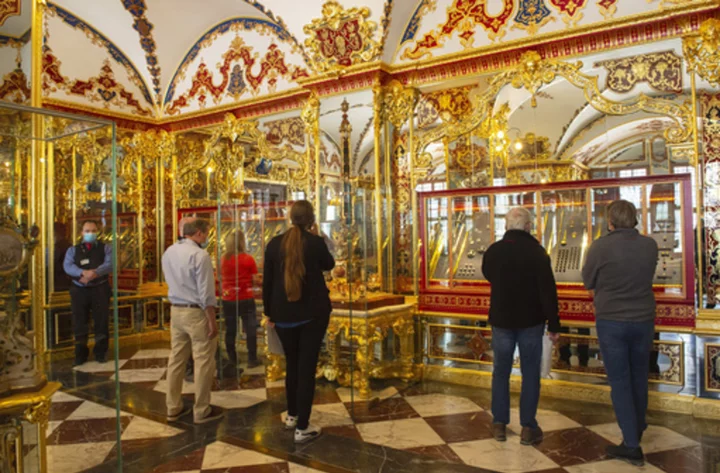BERLIN (AP) — A German court convicted five men Tuesday of breaking into a Dresden museum and stealing 21 pieces of jewelry containing more than 4,300 diamonds.
The men ages 24 to 29 received prison sentences ranging from four years and four months to six years and three months, German news agency dpa reported. One defendant was acquitted.
The Dresden state court ruled that the five were responsible for the theft of the 18th century jewelry from the Green Vault Museum on Nov. 25, 2019. Officials said at the time that the stolen items included a large diamond brooch and a diamond epaulet.
The crime was considered one of Germany's most spectacular jewelry heists in recent history. The pieces taken had a total insured value of at least 113.8 million euros ($129 million).
The men were accused of starting a fire just before the break-in to cut the power supply to street lights outside the museum, and also setting fire to a car in a nearby garage before fleeing to Berlin. They were caught several months later during raids in Germany's capital.
The court convicted them of particularly aggravated arson in combination with dangerous bodily injury, theft with weapons, damage to property and intentional arson.
The judges who heard the case observed that some of the men had acted with “considerable criminal energy,” dpa reported. The aim was “to get rich,” the judges said.
More than 100 witnesses and 11 experts gave testimony during the trial's main proceedings, according to the news agency.
The Green Vault is one of the world’s oldest museums. It was established in 1723 and contains the treasury of Augustus the Strong of Saxony, comprising around 4,000 objects of gold, precious stones and other materials.
In January, the defense, prosecution and court reached a plea bargain after most of the stolen jewels were returned. However, some of the most important pieces featuring large diamonds remain missing, according to dpa.
Four defendants who agreed to the plea bargain subsequently admitted their involvement in the crime through their lawyers. The fifth defendant also confessed, but only to helping to procure objects such as the axes used to make holes in the museum display case, dpa reported.
The returned pieces do not erase the fact that the museum's collection of complete jewelry sets “is probably destroyed forever,” Presiding Judge Andreas Ziegel Ziegel said.
The state of Saxony, where Dresden is located, claimed damages of almost 89 million euros to cover the cost of pieces that were returned damaged, the missing jewelry and repairs to the destroyed display cases and the museum building.
In his remarks Tuesday, Ziegel directly addressed the defendants, saying it is up to them to decided whether to continue committing crimes.
“There are things in your life that are worth living a different life for,” the judge said said, according to dpa. “It’s your choice what you do with your life.”









